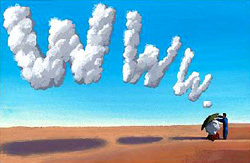
A framework for smoke signals

If a group of serious people, representatives of the media and their employees, makes an ambitious and archaically-named Draft Strategy for Development of the System of Public Informing in the Republic of Serbia Until 2016 – which is intended to be reviewed by the Government of Serbia – without a single mention of the words 'internet', 'web site' or 'web portal', it is obvious that such a group has serious difficulties in understanding the task it was entrusted with. More specifically, the group cannot understand the present or the future of the media, while the readers of this document are free to interpret the possible euphemisms used by experienced lawyers and editors from the Work Group to describe the media that has so profoundly changed the human communication, journalism and life in general.
We are left guessing why the internet is mentioned only once, within the phrase 'electronic editions of print and electronic media outlets', which seems to present web portals from an extremely amateurish point of view, similarly to newspapers, but without the ink. This is how this is supposed to be until 2016, with chapters like "Media Outlets", which describes 'Print Media and Agencies' and 'Electronic Media' but does not mention web portals, implying that they are not media outlets. This chapter (3.7) includes a section entitled "The Media on New Technological Platforms", but it does not even remotely mention the internet. Perhaps the Work Group negates the first electronic communication miracle after McLuhan in an attempt to anticipate something new, something that we cannot even imagine.
"Taking into account that media outlets have traditionally been regulated through the press and broadcasting regimes – which involve different sets of rules – and considering that new media platforms are changing rapidly, the Republic of Serbia, desiring not to limit their development, will insist on adherence to relevant principles of the press and radio/TV with regard to electronic editions of the print and electronic media outlets, while in relation to various forms of expression on new platforms it will apply rules that depend on factual circumstances of each individual case, especially taking into account the existence of editorial control over content", writes the group of authors.
Who was capable of writing something like this? The paragraph leaves an impression of difficulty in clear expression of thoughts, prompting us to reread it carefully. We have tried to decipher what the 'new technological platform' is, but without success. What exactly is the "existence of editorial control over content" or "factual circumstances of each individual case"? Are the web portal journalists using the "new platforms" without being aware of it?
Whatever the platforms may be, the internet media is also not mentioned in the chapter 'Media Concentration': "Within its media legislation, the Republic of Serbia will stipulate limits for impermissible media concentration in the radio and TV sectors, especially with regard to services related to licenses issued via public contests, as well as limits for impermissible media concentration resulting in cross-sector media ownership", says the document.
What about news portals – the media that does not require any license? Will the status of those who are professionally active only in the field of internet journalism be regulated by rules on founding of media outlets? What is the "limit" of media concentration in relation to web portals? Has anyone thought of the possibility that possession of one or several newspapers and portals amounts to media concentration that is similar to ownership over TV or radio stations and web portals? How many of them should a physical person be allowed to own at the same time? What about private companies? What kind of tax relief should be available to owners of media web sites, having in mind that the state intends to help the newspapers by reducing taxes and allowing import relaxations?
Such topics are not mentioned by the Work Group; in the market and in its relation to the state – and, obviously its colleagues – the media of the future is treated like a common shop. Unlike the editors and lawyers, the prosecutors who press charges against independent newspapers published in the form of a news portal are perfectly aware of all factors, although no one has informed them about the new technological platform. The position of web sites has been more precisely defined by lawsuits than by the Draft Strategy.
Not a single chapter of the document – which is intended for the Ministry of Culture and the Government of Serbia – has taken into account the fact that the internet is an environment of the future of information and communication, and that it conforms to specific rules. This effort of the Work Group seems like an attempt to create an institutional framework for transmission of smoke signals and writing of graffiti, together with relevant editorial freedom and tax relief. "Stimulation of media literacy" is completely absent from the Draft, although it is supposed to be the aim of the activities of the state, in the opinion of the Work Group.
The part that is missing from the Draft has made the authors' intention and effort fruitless, prompting us to ask – why? What is the purpose this document full of conditional sentences and nonchalant deviations from norms, while the unconstitutionality of the Law on Information – which is supposed to have a high priority among the members of the profession – has been neglected for too long.
Bojan Toncic
MC Newsletter, July 1, 2011
View all comments (0) Leave a comment
Published comments contain opinions that are not the opinions of Media Center. Responsibility for the content of messages and their accuracy lies on the website users who posted them.
 |
| The content of this article does not necessarily reflect the view of the Media Center. The author bear full responsibility for the content of the text. |







